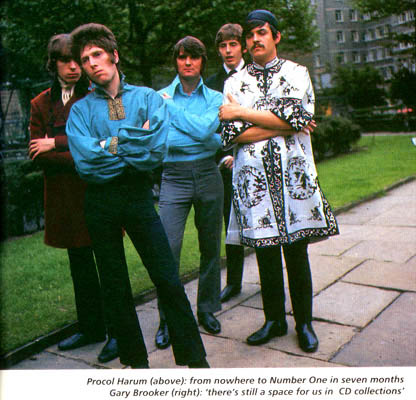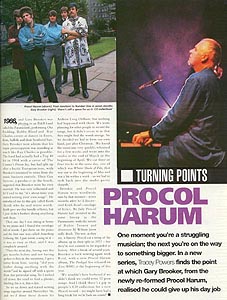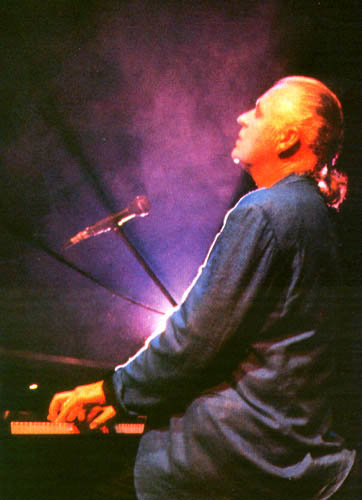
Procol Harum
Beyond |
|
|
|
|

One moment you are a struggling musician; the next you're on the way
to something bigger . In a new series, Tracey Powers finds the point at
which Gary Brooker, from the newly-reformed Procol Harum, realised he could
give up his day job.

1966, and Gary Brooker was playing in an R&B band called the Paramounts, performing Otis Redding, Bobby Bland and Ray Charles covers at dances in Essex, Kent, Suffolk, and their Southend base.
Gary Brooker now admits that his major preoccupation was sounding as much like Ray Charles as possible. The band had actually had a Top 40 hit in 1964 with a copy of the Coasters' Poison Ivy, but had split up after a hectic European tour, with Brooker's intention to retire from the music business entirely.
Then Guy Stevens, a producer in the South [sic
], suggested that Brooker write his own material: 'He was very influential
and he'd said to me, "It's about time you started writing your own songs."
He introduced me to this guy called Keith (Reid) who said he wrote words.
Keith gave me this bundle of lyrics, but I just didn't bother doing anything
with them.

'Then one day I was sitting at home by my piano and I found this envelope full of words. I put them on the piano and the first one was called Something Following Me. I just wrote a song to it – it was as easy as that, and I was completely amazed.
'Then the next day, having met this guy months before and not having spoken to him in the meantime, I got a letter from him, saying, "Did you bother doing anything with the words?" and he signed off with a quote from that particular song. So I rushed off down the road to find a 'phone thinking this is it, this is fate.
'So we sat down and started writing songs together around November '66, and we'd done these demos for Andrew Loog Oldham, but nothing had happened with them. We were planning for other people to record the songs, but it didn't occur to us that they might find the words strange. So we decided we had to form our own band, just after Christmas.
We found the musicians very quickly, rehearsed for a few weeks and went into the studio at the end of March or the beginning of April. We cut three or four tracks in the same day, one of which was Whiter Shade of Pale, that was out at the beginning of May and was a hit within a week – so we had to rush back into the studio pretty sharpish.'
Brooker and Procol Harum were worldwide stars by that summer – seven months after he discovered Keith Reid's envelope of lyrics. By July Procol Harum had reverted to the same line-up [sic] as the Paramounts, with the return of Robin Trower and drummer BJ Wilson (now sadly dead). The rest, as they say, is history.
Procol cut a string of hit albums up to their split in 1977 – but they are not content to be regarded as history. After a break of several years Brooker is back writing again with Reid, with a new Procol Harum album, The Prodigal Son [sic] released on Zoo/BMG at the beginning of this year.
'We wouldn't have bothered if we didn't think we could write 12 great songs. I think there's a gap in people's CD collections for a new Procol record – we might have had a long break but we're back on course'.
More Procol History in print at BtP
|
|